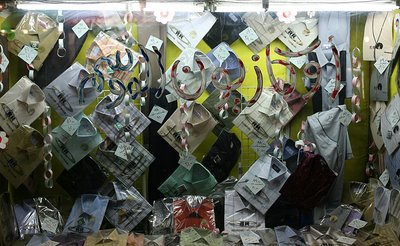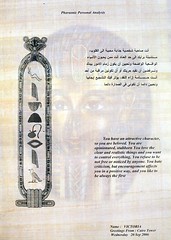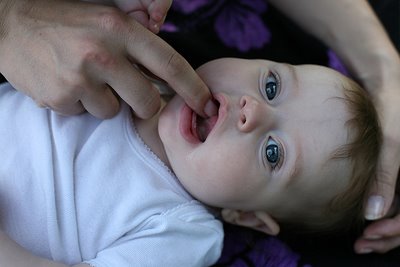Saturday, September 30, 2006
Ayman vertelde me dat hij met het vasten breken elke avond als eerste drie sigaretten achter elkaar rookt. Ik moet er niet aan denken. Na een hele dag niet drinken in deze vervuilde, stoffige stad is je keel zo droog als gort.
Friday, September 29, 2006
Etalage

Deze winkel zit in een mooi jaren dertig pand midden op de Midan Talaat Harb. Dit moet ooit het sjiekste plein van de stad zijn geweest. In de originele houten winkelkasten ligt in plastic verpakt textiel. Verveelde tienermeisjes openen de verpakking op verzoek. Als een broek te groot is, gebaren ze bijna geïrriteerd dat je de pijpen toch om kunt slaan. Zouden zij de kleuterschool-stijl slingers gemaakt hebben die in de etalages hangen?
Thursday, September 28, 2006
Moving Picture
Every morning I say Sa bach El Gir to the makwaggis in front of our house. They are iron men and collect our dirty laundry and deliver it the next day. Today they wanted me to take a picture with my videocamera.
Wednesday, September 27, 2006
Prullenbak
"Do you have a garbige bin?" vraag ik aan de geuniformde meneer bij de roadblock onderweg naar het Egyptisch Museum. Zonder terughoudendheid pakt hij de bananenschil uit mijn hand en zegt, "Yes." En met een sluwe lach gooit hij de schil met een sierlijke boog over zijn schouder over het hek van het ernaast gelegen bouwterein.
Tuesday, September 26, 2006
Egyptisch Nederlands
Rond het Egyptisch Museum spreken Egyptenaren toeristen aan. Ze leren elkaar Nederlandse zinnen:
Mijn oom woonde in Groningen! Hij is fan van Rita Corita.
Mijn broer werkt op de zwarte markt in Beverwijk!
Mijn oom heeft gewerkt met Sonja Barend in Hilversum!
Mijn oom woonde in Groningen! Hij is fan van Rita Corita.
Mijn broer werkt op de zwarte markt in Beverwijk!
Mijn oom heeft gewerkt met Sonja Barend in Hilversum!
Monday, September 25, 2006
Sunday, September 24, 2006
Vandaag is de ramadan begonnen
Van half zes 's ochtends tot zeven uur 's avonds eten, drinken en roken moslims niet, ze hebben ook geen sex. 's Middags al dringt de geur van linzensoep ons huis binnen. Iedereen is aan het koken.
Je zou de openingscène van Vanilla Sky in Cairo kunnen opnemen vandaag, zo stil is het op straat.
Je zou de openingscène van Vanilla Sky in Cairo kunnen opnemen vandaag, zo stil is het op straat.
Saturday, September 23, 2006
Stadskalf
We lopen op straat hier om de hoek van ons huis als ik een geluid hoor dat mijn aandacht trekt. Ik weet niet meteen waarom. Maar als ik het opnieuw hoor, begrijp ik het. Het is het geluid van een dier, hier midden in de stad. Maar welk dier? Mijn ogen speuren de straat af. Dan zie ik het. Een kalf staat vastgebonden aan een parkeermeter aan de overkant van de straat. Het is een groot, harig, bruin beest. Zijn loei is laag en doordringend.
Als we een paar uur later terugkomen lig er naast de parkeermeter een grote plas bloed en poep en hebben de mannen in de slagerij een hoogoplopende ruzie met elkaar.
Als we een paar uur later terugkomen lig er naast de parkeermeter een grote plas bloed en poep en hebben de mannen in de slagerij een hoogoplopende ruzie met elkaar.
Friday, September 22, 2006
Pharaonic Personal Analysis
Today we visit the Cairo Tower. It was build in the sixties with American money mend to buy US arms. The tower is 187 meter tall and is made of granite. It ranks fourth among the worlds highest towers. It is said to imitate a lotus plant.
To the late President Gamal Abdul Nasser, the tower's restaurant was the best place to dine out. He used to go there together with his family. Today, the restaurant is a shabby place. We are the only ones there. The tables are cracked and the green-white checkered table-clothes are dirty. A guy with a Pharaonic head-wear comes up to us, he wants to know if we want to buy a Pharaonic Personal Analysis. We do so for 5 months-old Victoria. The analysis seems to be very accurate, although we guessed her favorite color to be yellow.

Pharaonic Personal Analysis
Originally uploaded by juliavm.
To the late President Gamal Abdul Nasser, the tower's restaurant was the best place to dine out. He used to go there together with his family. Today, the restaurant is a shabby place. We are the only ones there. The tables are cracked and the green-white checkered table-clothes are dirty. A guy with a Pharaonic head-wear comes up to us, he wants to know if we want to buy a Pharaonic Personal Analysis. We do so for 5 months-old Victoria. The analysis seems to be very accurate, although we guessed her favorite color to be yellow.

Pharaonic Personal Analysis
Originally uploaded by juliavm.
Thursday, September 21, 2006
Wednesday, September 20, 2006
Tuesday, September 19, 2006
Dust Everywhere
The first thing you notice arriving in Cairo is the dust. You can feel it on your tongue and it makes your throat dry. In two hours after cleaning a table, you can write your name in the dust.
Dust is usually defined as a mass of fine, dry particles, less then 0.0625 millimeter in diameter, smaller than the tiniest grains of sand. It can be made up completely of dirt deposit, or numerous combinations of fine dirt and other materials. The dust in Cairo is mineral material that comes from floors of desert basins, bare soil, plowed fields, river flood plains, smoke and ash produced by fires and decaying organic material.
Grains of sand lofted into the air by the wind fall back to the ground within a few hours, but smaller particles remain suspended in the air for a week or more and can be swept thousands of kilometers downwind. Dust from the Sahara desert regularly crosses the Atlantic, causing bright red sunrises and sunsets in Miami, traveling as far as the Caribbean and the Amazon basin. An average Egyptian household contains 26 kilos of dust, that’s a garage full.
Dust is usually defined as a mass of fine, dry particles, less then 0.0625 millimeter in diameter, smaller than the tiniest grains of sand. It can be made up completely of dirt deposit, or numerous combinations of fine dirt and other materials. The dust in Cairo is mineral material that comes from floors of desert basins, bare soil, plowed fields, river flood plains, smoke and ash produced by fires and decaying organic material.
Grains of sand lofted into the air by the wind fall back to the ground within a few hours, but smaller particles remain suspended in the air for a week or more and can be swept thousands of kilometers downwind. Dust from the Sahara desert regularly crosses the Atlantic, causing bright red sunrises and sunsets in Miami, traveling as far as the Caribbean and the Amazon basin. An average Egyptian household contains 26 kilos of dust, that’s a garage full.

